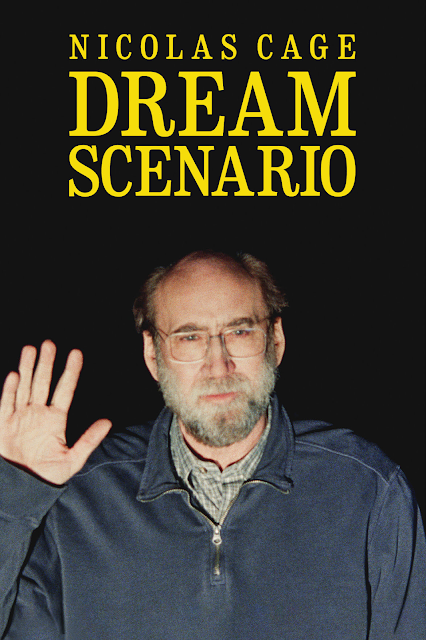Dream Scenario, a film written/directed by Kristoffer (A Place We Call Reality) Borgli, and produced by imagi-maestros, Ari Aster and Lars Knudsen, is a tour de force for its lead, Nicolas Cage, who portrays Paul Matthews, a biology professor whose persona ends up entering people's dreams.
The concept is Twilight Zone-ish and at the start breezy, with a tonality akin to New York Stories' "Oedipus Wrecks," where Woody Allen is accosted by his flashed-from-existence mother, who intermittently reappears at the most inopportune times. As the story progresses, Dream Scenario becomes a darker Zone, depicting a good man labeled as bad, due to no fault of his own.
At the outset, Matthews is no more than a silent observer in people's dreams, as strange things happen to them. People who know Matthews tell him of his abrupt, nightly appearances, and he (and they) begin to acknowledge the strange, common denominator at play. This becomes even more baffling when strangers begin to recognize Matthews, claiming his likeness has also infiltrated their dreams, and from such, a phenomenon grows. Matthews become a celebrity, liked and enjoyed by most, even though the causes and effects of his manifestations are open for varied interpretations.
After doomed tryst with a pretty, marketing assistant (Dylan Gelula), who's experienced repeated, amorous reveries of Matthews, his image thereafter enters people's dreams for the evident cause to harm them, making him a neo Freddy Krueger. As such, he becomes feared and hated to the point that he can go nowhere without being ridicule or assaulted. Even his long-time friend (Tim Meadows), the dean of the college where he works, distances himself from Matthews, which only breaks his spirit further.
A public-relations CEO (Michael Cera) brainstorms ideas to remedy Matthew's dilemma, but the professor just wants to be let alone, to slip into obscurity, if not for himself, then for the sake of his beleaguered wife (Julianne Nicholson) and daughter (Jessica Clement). But his detractors turn Matthews into as a scape goat to cloak their misguided beliefs, which are in turn fueled by an uncaring, biased media.
I couldn't help but feel for Matthews, for he falls into a category that besmirches many people today: guilt by association. Cultural critics and their offshoots aren't inclined to acknowledge the truth and therefore, they only worsen baseless prejudices. (To drive this home, there's a disturbing scene where an interviewed, college student defames Matthews for having misused his dream-manifestation powers, and her uninformed condemnation is accepted carte blanche by the others in her group study. This cancel-culture derision is palpable to the point of being much more nightmarish than any of the surreal scenarios in which Matthews appears.)
In the end, Matthews does find his way, though perhaps not as he preferred. Dream Scenario's careful delineation of his woeful journey is captivating and therefore, memorable. It's just too bad that most socio-cultural know-it-alls will bypass the movie, or if they do give it a shot, they'll fail to see their own ill-willed behavior in it. Nevertheless, Dream Scenario exists as a lesson well taught for those open-minded enough to accept it.













No comments:
Post a Comment